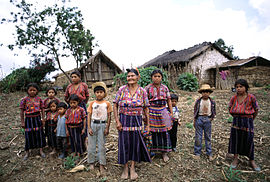Goân-chū-bîn
(Tùi Goân-chū-bîn-cho̍k choán--lâi)
Kin-kù Liân-ha̍p-kok ê tēng-gī, goân-chū-bîn (Eng-gí: indigenous peoples) sī:

- "Goân-chū siā-kûn, jîn-bîn ia̍h bîn-cho̍k sī chí le̍k-sú iân-sio̍k tùi ji̍p-chhim kap si̍t-bîn chìn-chêng, hoat-tián chū in léng-he̍k ê siā-hōe, in siong-sìn ka-tī kap kî-tha hiān-sî chi-phòe hia leng-he̍k (he̍k-chiá pō͘-hūn) ê siā-hōe bô-kâng."[1]
Chù-kái
siu-kái- ↑ Eng-gí goân-bûn: Indigenous communities, peoples and nations are those which, having a historical continuity with pre-invasion and pre-colonial societies that developed on their territories, consider themselves distinct from other sectors of the societies now prevailing in those territories, or parts of them.
| Pún bûn-chiuⁿ sī chi̍t phiⁿ phí-á-kiáⁿ. Lí thang tàu khok-chhiong lâi pang-chō͘ Wikipedia. |